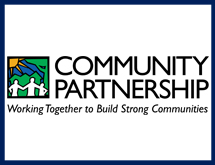Top Tips: Mental Health First Aid
Article provided by Community Partnership of the Ozarks
The COVID-19 pandemic has led to stay-at-home orders and physical distancing to help prevent the spread of the virus. It is natural to feel socially distant from loved ones or co-workers when we are not able to visit in person, face-to-face. It is important, however, to keep an eye out for warning signs of possible mental health challenges when loved ones or co-workers are withdrawn or isolating themselves. Look for a significant change in behavior or decreased social engagement. For example, if someone would normally respond to your efforts to reach out to them, but you notice a significant delay in response time or no response at all, check in on them. You can send them a message or leave a voicemail letting them know that you care, you’ve noticed they haven’t responded, that you wanted to make sure they are ok, and that you’re there to talk to them if they would like to. Oftentimes, just being invited to share can be the start of a conversation to help the person process their feelings.
Stigma associated with mental health disorders poses a large barrier to recovery and is a significant reason why people do not seek help and treatment. Youth Mental Health First Aid (Y/MHFA) and Adult Mental Health First Aid (MHFA) are two evidence-based trainings (collectively known as Y/MHFA) designed to impact concerns associated with mental health disorders, as well as their associated stigma. Y/MHFA decreases overall stigma around mental health by educating participants about mental health and teaching them how to counter negative attitudes associated with mental health disorders and stigma around accessing and receiving mental health services and support.
These trainings teach adults signs and symptoms of someone who may be experiencing a mental health challenge or crisis, as well as a five-step action plan to intervene as a caring adult until appropriate professional help is received or until the challenge or crisis is resolved. This five-step plan is like the ABC’s of CPR, but for challenges related to mental health rather than physical health. Along with information on mental health, Y/MHFA also includes enhanced focus on opioids and other substances and how to intervene when misuse or an overdose is occurring. These trainings are especially beneficial to those who interact with teens and adults regularly, including medical professionals interacting with patients every day who often need mental health support as much as they need physical health improvement.
In Spring 2019, the Greene County Community Mental Health and Substance Abuse Assessment report was released. Identified in the report were the needs to destigmatize mental health challenges and strengthen awareness of early intervention resources, especially Y/MHFA. The 2019 Community Focus Report identified Y/MHFA as a “Blue Ribbon”, an area of strength, while mental health and suicide are listed as areas of concern, or “Red Flags.”
Community Partnership of the Ozarks (CPO), in collaboration with other local partners, has trained over 2,600 Greene County residents as Y/MHFA First Aiders since 2015. Of those 2,600 individuals, 1,000 are Greene County school district staff and 460 are staff from other social services providers, including all Springfield-Greene County Health Department employees. Following the training, First Aiders report monthly the number of individuals they referred to professional help, self-help, and other support strategies during the previous month. This has resulted in more than 2,300 referrals to adults since 2018 and over 29,000 referrals to youth since 2015. One training participant who works daily with youth shared, “I don't panic anymore when a student tells me of thoughts or evidence of self-harm or suicide ideation. I am able to ask follow up questions in a calmer, more confident way.”
There are many self-help strategies that can improve our mental health and help us move up the spectrum toward optimal mental health. Many are the same strategies that improve our physical health. Community Partnership of the Ozarks has created a series of short videos to introduce viewers to various self-help and other support strategies related to mental health promotion. We also created brief videos introducing viewers to signs and symptoms of possible mental health challenges or crises. These are important warning signs to be aware of for yourself and loved ones in order to identify challenges early and possibly prevent a mental health crisis. You can find these videos by visiting cpozarks.org/covid19 or cpozarks.org/mentalhealth. We encourage you to take mental health moments for yourself in order to strengthen your resilience to stress.
To learn more about Y/MHFA or to register for this important training, visit cpozarks.org/mentalhealth.

